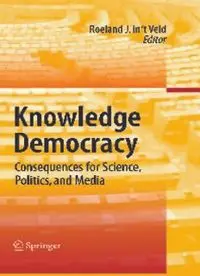
Knowledge Democracy: Consequences for Science, Politics, and Media PDF
Preview Knowledge Democracy: Consequences for Science, Politics, and Media
Knowledge Democracy Roeland J. in ’t Veld Editor Knowledge Democracy Consequences for Science, Politics, and Media 123 Editor Prof. Dr. Roeland J. in ’t Veld Waterbieskreek 40 2353 JH Leiderdorp Netherlands Preface and acknowledgements This volume is devoted to an important and challenging idea: knowledge democ- racy. It will mobilise the necessary attention for the emerging threats and opportu- nities of relationships between science, media and politics, we hope. The book was inspired by the more than 200 contributions from scientists, policy-makers en media representatives who participated in the international conference Towards Knowledge Democracy which was organised by the Netherlands Advisory Coun- cil for Research on Spatial Planning, Nature and the Environment (RMNO) in co- operation with many other organisations on 25–27 August 2009 in Leiden, the Netherlands. We asked twenty of the most interesting paper givers to compose their contri- bution into a chapter. They, as the authors of this book, are the first I would like to thank. Moreover, I am very grateful to the members of the scientific advisory board for reviewing the draft chapters. Their comments were very valuable. They have improved the arguments in this book. Therefore I want to thank Prof. Dr. Frans Berkhout (VU University of Amsterdam), Prof. Dr. Herman Eijsackers (Wagenin- gen University and Research Centre), Prof. Dr. Rudy Rabbinge (among others chairman of the Science Council of the Consultative Group on International Agri- cultural Research) and Prof. Dr. Julie Thompson Klein (Wayne State University). And finally, without the enormous enthusiasm and endurance of the RMNO team that organised, edited, formatted and proof-read the book contributions within tight time constraints, this publication would have never been possible: Madelon Eelderink and Sophie Jongeneel who did most of the organising and edit- ing work, Louis Meuleman, Bert de Wit and Martijn Ligthart, who commented and brought in their extensive experience. Roeland Jaap in ’t Veld Scientific Advisory Board Prof. Dr. Frans Berkhout is Professor of Innovation and Sustainability, and Di- rector of the Institute for Environmental Studies (IVM) at the VU University in Amsterdam, The Netherlands. Until 2004 he was a Senior Fellow at SPRU (Sci- ence and Technology Policy Research), University of Sussex (UK) and Director of the UK Economic and Social Research Council’s (ESRC) Sustainable Technolo- gies Programme. Prof. Dr. Herman Eijsackers is currently chairman of the Scientific Board of Wageningen University and Research Centre, which advises the Board on the di- rection and quality of research and education. He was scientific director of the En- vironmental Sciences Group, department Alterra at the Wageningen University and Research Centre. He is extraordinary professor at the VU University in Amsterdam. Prof. Dr. Rudy Rabbinge is among others chairman of several national and in- ternational organisations. He is deputy chairman of the Netherlands Commission for Environmental Assessment (MER), chairman of the Science Council of the Consultative Group on International Agricultural Research (CGIAR, Rome/ Washington DC, Italy/USA). Prof. Dr. Julie Thompson Klein is Professor of Humanities at Wayne State Uni- versity and has been a Visiting Professor in Japan, a Fulbright professor in Nepal, a Distinguished Visitor at the University of Auckland in New Zealand, and a Sen- ior Fellow at the Association of American Colleges & Universities. Contents Preface and acknowledgements............................................................................ v Scientific Advisory Board ................................................................................... vii Contents ................................................................................................................ ix 1 Towards Knowledge Democracy .................................................................... 1 1.1 The overwhelming success of democracy ................................................... 2 1.2 The curse of success .................................................................................... 3 1.3 Wide access to information for everyone .................................................... 5 1.4 From knowledge economy to knowledge democracy .................................. 6 1.5 Reflexivity ................................................................................................... 7 1.6 Transdisciplinarity ..................................................................................... 10 2 The harvest of the “Towards Knowledge Democracy” conference ........... 13 2.1 The character of the knowledge democracy concept ................................. 13 2.2 The institutional context of knowledge democracy ................................... 14 2.3 The constitutional values in a knowledge democracy................................ 15 2.4 The people ................................................................................................. 15 2.5 The political process: agenda-setting ......................................................... 16 2.6 Wicked problems and configurations ........................................................ 17 2.7 Media ......................................................................................................... 18 2.8 Transdisciplinarity ..................................................................................... 18 2.9 Boundary work .......................................................................................... 19 2.10 Roles of creativity and knowledge ........................................................... 20 2.11 Unwelcome knowledge ........................................................................... 20 2.12 Future research ........................................................................................ 21 2.13 Long term decisions ................................................................................. 21 2.14 Knowledge governance ........................................................................... 22 2.15 Commissions as innovative boundary organisms .................................... 23 2.16 Political networks .................................................................................... 24 2.17 Knowledge democracy, innovation and sustainability ............................. 24 3 Heads in the clouds: knowledge democracy as a Utopian dream .............. 25 3.1 From “speaking truth to power” to knowledge democracy ....................... 25 3.2 Dreaming of knowledge democracy .......................................................... 27 3.3 Political, scientific, technological and governance utopia ......................... 30 3.4 Knowledge democracy as a utopian dream ............................................... 31 3.5 Knowledge democracy in practice: two examples from environmental governance................................................................................................. 32 3.6 Utopian dream or totalitarian nightmare? .................................................. 34
